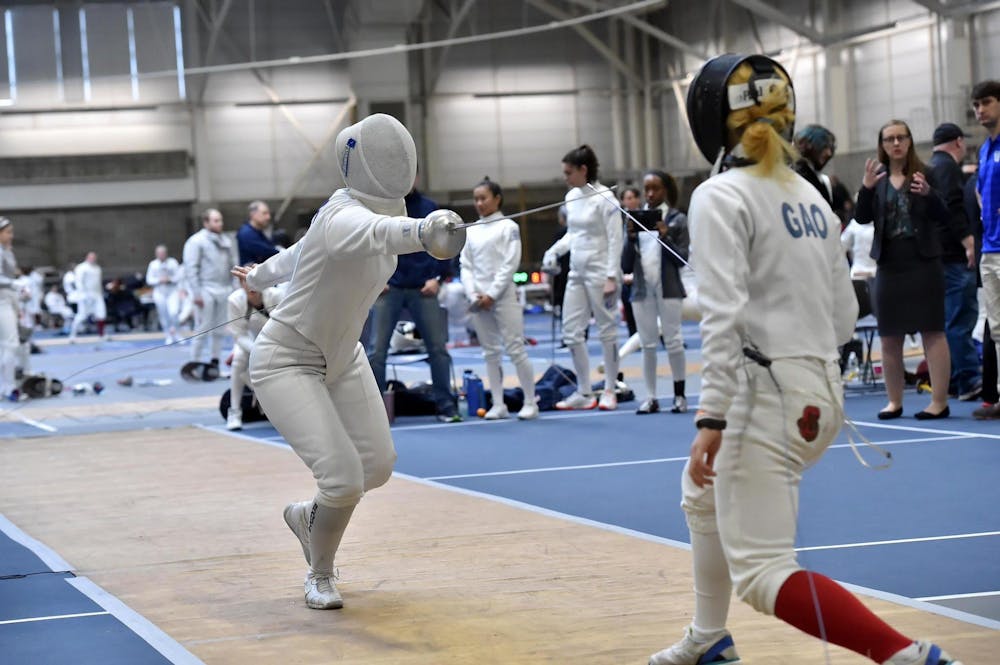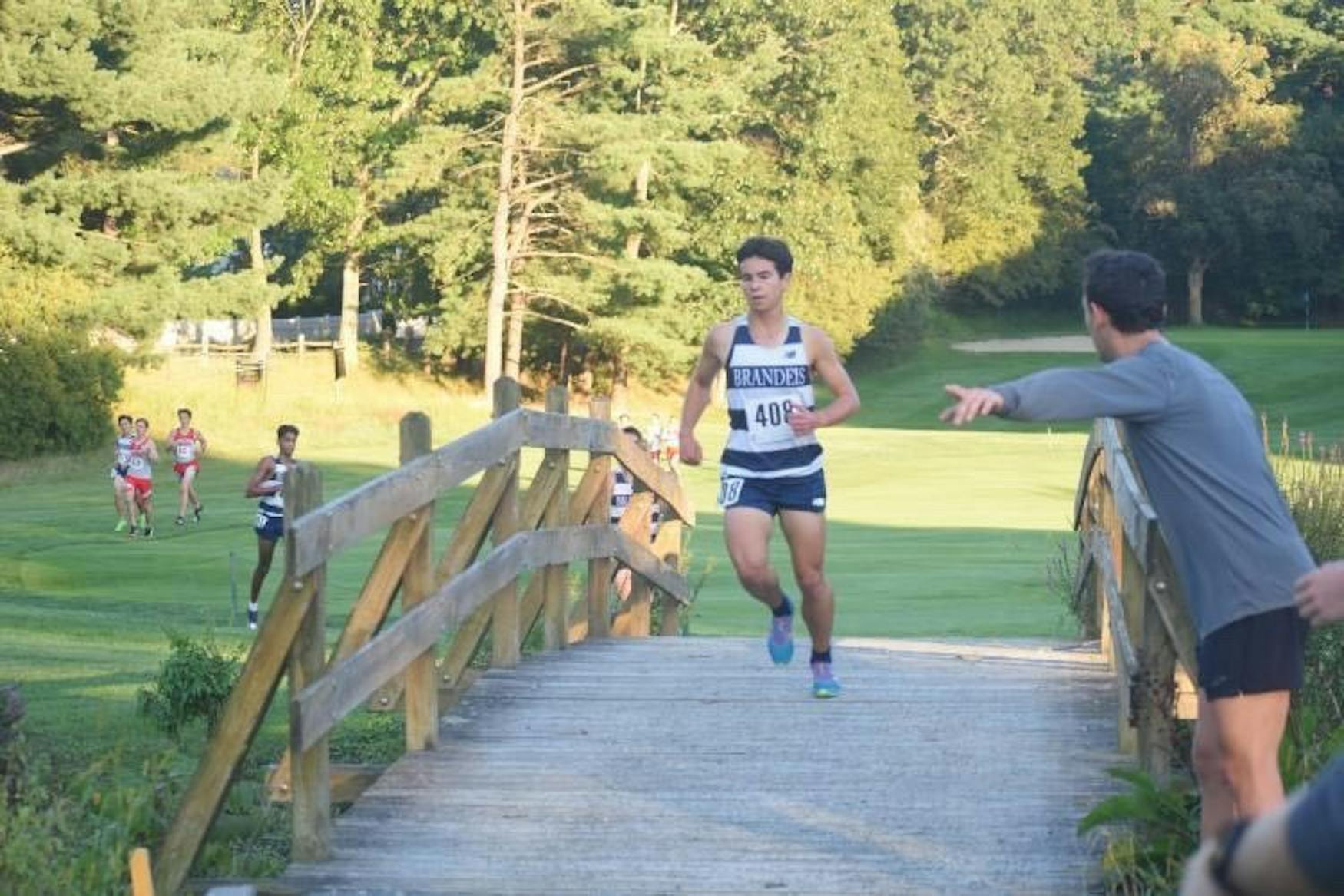For transgender student-athletes, new policy is more than just rules and guidelines
The Justice spoke to Jac Guerra ’22, Alexander Wicken ’23 and Director of Athletics Lauren Haynie about the Brandeis Athletics Transgender Student Inclusion Policy that was released last month.
As captain of two varsity teams, track and cross country, and a double major at Brandeis, Jac Guerra ’22, who identifies as a man with transgender experience, is no stranger to taking on challenges that others might find daunting. But even for him, navigating the National Collegiate Athletic Association guidelines while taking steps in his personal transition was not a simple task.
“Transitioning while being a student athlete was intense in terms of figuring out how to make sure everything I have been doing is allowed in the eyes of the NCAA,” Guerra told the Justice in an Oct. 10 interview over Instagram direct message. This is one of the main issues that the new Brandeis Athletics Student Inclusion Policy, released on Sept. 10, attempts to address. In it, the guidelines set by the NCAA for trans athletes — including their options for which teams they can participate in based on their assigned gender at birth and whether or not they choose to receive hormone treatments — are clearly laid out.
During Guerra’s first year at Brandeis, he competed on the women’s teams, as he had done in high school, but it wasn’t long before he started thinking about transferring to the men’s teams. At the time, Guerra wasn’t even sure if this was an option for him. “I personally was a bit in the dark when first considering joining the men’s side,” he said. He explained that having a document that explained his options, like the newly released policy, would have been a “great tool to have [back then].”
In February 2020, during his sophomore year, Guerra told his coach that he was planning to begin the process of switching from the women’s to the men’s teams. Cross country and track coach Sinead Evans was immediately supportive, according to Guerra. At the time, no comprehensive policy existed for trans student-athletes pursuing NCAA waivers in order to move from a women’s to a men’s roster, or vice versa. But by the fall of 2020, the Athletics department had begun working on creating a policy. In an interview conducted over email on Oct. 8, Director of Athletics Lauren Haynie said that this was in response to a student who had made the decision to transfer rosters, though she did not name the student.
Guerra said that he was among a group of students who had the opportunity to give their input on the policy before it was finalized. “Associate Director Lynne Dempsey and Athletic Director Lauren Haynie reached out to different students like myself for thoughts and comments. I thought that that was a really effective way to have LGBTQ students address the policy before it was publicly announced,” Guerra said.
With the new policy document, Brandeis students in positions similar to Guerra’s can be confident that they will receive full support from their coaches, the Athletics department and the University.
Haynie explained that under NCAA rules, each school has the choice of whether they will support student-athletes who are transitioning in the process of obtaining the necessary waivers. “Through our creation and release of this policy, Brandeis is publicly acknowledging that we are an institution that will be supportive of students as they pursue opportunities to affirm their gender identity,” Haynie said.
“While each college or university retains institutional autonomy in pursuing the waiver process, Brandeis Athletics is committed to assisting student-athletes considering gender transition,” the policy states. Guerra praised this component of the Inclusion Policy, saying, “This policy makes it clear that transgender student athletes are welcome to work with their coaches to get the NCAA’s support in allowing them to compete.”

FENCING: Wicken poses for the camera on media day this year.
Alexander Wicken ’23, also a transgender student-athlete, shared his personal experience at Brandeis with the Justice in a Zoom interview on Oct. 6. Wicken is a member of the Brandeis fencing team. He first came out as transgender when he was 13, but waited until his sophomore year of high school to come out to his fencing teammates, and it wasn’t until senior year that he came out to his high school team’s coaches.
When Wicken first started at Brandeis, he said he didn’t know which fencing team he wanted to join, in part because he wasn’t sure about which medical steps he would be taking in his transition, such as hormone treatments and surgery. He spoke to his coach, Jennie Salmon, before the start of the season. Like Coach Evans, she was completely supportive, telling Wicken that he could be on whichever team he chose.
Since the Transgender Student Inclusion Policy didn’t exist at the time, Salmon took the time to look into the NCAA’s policies and speak to the athletic directors to make sure that both she and Wicken were clear on the guidelines regarding which team he could play for if he decided to begin hormone treatment or take other medical steps in his transition. Thanks to the efforts of the Athletic department and the other departments and individuals involved in developing the policy over the past year, student-athletes with situations similar to Guerra’s and Wicken’s can now look to the Transgender Student Inclusion Policy — which can be accessed easily on the Brandeis Athletics website.
The new policy document explains the Brandeis-specific policies that respect students’ gender identities through inclusive language, dress codes, uniforms and facilities. It also includes a section on additional resources at Brandeis and a section on education, which states that a Transgender Participation Committee will be established at Brandeis: “Members of the committee will represent a cross-section of the institutional staff with student well-being interests,” the document reads.
Wicken said that the new Brandeis policy makes the NCAA rules more accessible and comprehensible for students and coaches than the original NCAA document. “It makes it much easier for current student-athletes who are thinking about transitioning or for prospective student-athletes to see their options clearly,” Wicken said, adding that having easy access to information that this policy provides would have eased some of his anxieties when he was first entering Brandeis.
Eventually, Wicken made the decision to fence for the women’s team. “That was where I would, from my own understanding, most likely find the most success,” he said. Wicken appreciates the overall lack of gender separation in fencing at Brandeis, explaining that the women’s and men’s fencing teams practice together and go to the same competitions. “What matters to me isn’t the gender designation in the sport. It’s just fencing and having fun and being accepted by a team,” he said.

ON GUARD: Wicken competes in a fencing match during his first year at Brandeis.
Both Guerra and Wicken also spoke about the importance of education and the value of having guest speakers and events centered on transgender people in athletics. In 2019, Schuyler Bailar, who graduated from Harvard University that year, came to Brandeis to speak at an event attended by the Student Athlete Advisory Committee, student-athletes and administrators. Bailar made history during his four years on the Harvard men’s swim team as the first openly transgender man to compete on an NCAA Division I men’s team. Guerra spoke about this event and said that it was a “huge moment” for him.
“Having a prominent trans athlete come and speak at an event hosted by my own school felt really profound,” Guerra said, suggesting that the Athletics department could consider hosting more events with guests from diverse backgrounds, including LGBTQIA+ and BIPOC athletes and coaches. “I think a meaningful way to deal with gender discrimination is [through] education,” Wicken said, adding, “Specifically gender discrimination regarding trans people … you can always learn more … that, ‘Oh, these are just human beings living their lives.’”
He spoke about the way that education can help to humanize the trans experience and combat the lack of understanding that he feels affects people’s perception and treatment of trans individuals.
Wicken said that this is one of his main intentions with the event he is currently planning for the upcoming Transgender Day of Visibility on March 31. The event will be hosted by Brandeis over Zoom, and will bring together speakers and attendees from colleges across the nation. He described the event as focusing on support for trans athletes and centering the conversation on the trans athlete experience. Wicken said that when he brought this idea to the Athletics department, they gave him their full support and immediately started putting aside funding to make sure the event would be able to happen. Haynie also mentioned the event, explaining that Athletics is working with students to develop a panel discussion for Transgender Day of Visibility.
Guerra noted that no other schools in the University Athletic Association — the athletic conference that Brandeis is a part of — have a specific policy for transgender student-athletes. “Brandeis is the first school in the UAA to have such a policy, meaning that this department is willing to break new ground in order to support student athletes,” he said. Wicken also spoke about the important message that this policy sends to Brandeis students: “Having the policy be easily accessible and public makes it known that Brandeis supports you as a trans individual and as an athlete.”
The Brandeis Athletics Transgender Student Inclusion Policy isn’t going to change the way that the University’s sports teams, athletes and coaches operate on a day-to-day basis. While this might lead some to believe that the policy is insignificant, for students and faculty that make up the Athletics department — especially for the transgender students who are part of Brandeis teams — it’s anything but.
The Gender and Sexuality Center is a resource for all members of the Brandeis community seeking affirming information and support resources for the transgender community. Brandeisians with concerns about discrimination may file a report through the Office of Equal Opportunity at Brandeis.
This article has been updated to make sure students know where they can find information and resources if they face discrimination.



Please note All comments are eligible for publication in The Justice.